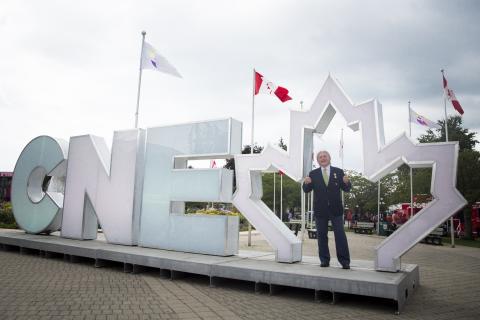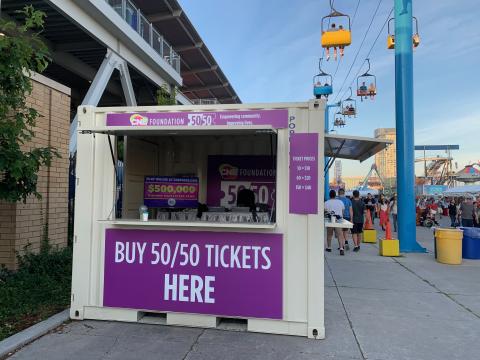
The mission of the CNE Foundation is to “inspire community building by investing in innovative initiatives.” Programs include the Pathways to Job Readiness for youth training and employment at the CNE for ages 14 to 29; Community and Youth Programs in sports and arts, such as the Lions-CNE Peewee Baseball Tournament, the CNE-Ontario Basketball Association 3-on-3 Tournament and the CNE Rising Star Talent Competition, The CNE Archives Fund, and outside the CNE and beyond the summer season Community Grants, which “help local qualifying Canadian registered charities make a difference in the lives of the clients they serve and help further our areas of focus.”
Samaritanmag spoke with John Kiru, president of the CNE Association board of directors (CNEA), and Joanne Benerowski, director of the CNE Foundation (CNEF), about refocusing its philanthropic efforts and letting the visitors and Canadian public know how the CNEF is helping youth and communities year-round.
Even though I've been going to CNE since I was a kid, I had no idea there was a foundation. I'm sure I'm not the only one. The Foundation hasn’t been around as long as The Ex. How do you get word out to these million and a half people that come through the gates each year?
John Kiru: The reality is your experience is probably the experience of many of the folks out there. It's a public foundation and a registered charity that was founded in 1975. While it’s served some general purposes and supported some youth-oriented programs over the years, the CNEF and the CMEA decided recently to reignite it philanthropic purpose by revitalizing, reviving the Foundation with a renewed vision and commitment to empowering communities and youth.
Prior to that happening, why is it that you needed to revitalize it and refocus?
Kiru: Because there really wasn't a focus on reaching out to philanthropists, for reaching out to a membership, to reaching out to other foundations to support our initiative. Our revenue was based through a small percentage we dedicated out of the casino to be used to fund some of the initiatives, whether it's local programs in Parkdale, whether it's to support association and likeminded foundations, et cetera… So that was the lay of the land, if you will. And as the CNE became independent — because prior to 2013, we were a program of the City [of Toronto] and served its purpose at that time — we realized that there was a significant opportunity to reignite the Foundation and, hence, the focus on programming that will generate revenue, hence the focus on Pathways To Job Readiness in engaging the youth and other initiatives. Other youth focus programs, archive, salvage and preservation. We've got thousands of pieces of archives and an opportunity to work on that. That's where it began. That's when we started to focus on how do we engage some of the philanthropic components? How do we get out there to ‘Jane’ who used to come to the CNE with her grandmother and she wants to leave a legacy and memory of her grandmother? That was never the focus and that's what we’re starting to do now.

Kiru: This is the second year. Last year was, I wouldn't call it a pilot because you don't do a pilot in a 50/50 draw, but the winner walked away with about $123,000 and that money [the other 50 percent] was certainly put towards some of the programming and reigniting the Foundation, building a strategic plan, starting to build relationships with others and that's what started our Pathway To Job Readiness. Some of that money was used for that initiative. This year is exciting because of the success of last year, the people that we operate the 50/50 through said the opportunity at the CNE for the CNEF is significant, that, in fact, this year’s prize is a guaranteed $500,000 for whoever wins.
It’s a good way for people spending a lot of money trying to win giant stuffed animals to know that you also have a foundation that helps people in the community.
Joanne Benerowski: The new piece is the availability of the 50/50 tickets online for the first time. Last year, it was just on-site and this year we were permitted to sell online. We're going to be able to start building awareness because we're building our electronic mailing list and building awareness on the site through the raffle.
Typically, who are your regular donors? Are they people that have great memories of the CNE when they were a child or others that are more interested in the specific grants you do?
Benerowski: We're in the process of building capacity for the Foundation, since we just relaunched last year. To date, we've had corporate donors. For example, we had the RBC Foundation come in as a major contributor to our Pathways For Job Readiness program. And we're really excited about that because our program objectives aligned with their programs as well.
In terms of the grants, is it only local charities and do you have an application process?
Kiru: We do have a process in place. Predominantly, it has been a locally focused. In the past, we've had applications from organizations such as CAFÉ, Canadian Association of Fairs and Exhibitions, which is a national organization that is likeminded we have contributed some funds to in the past, but mostly it has been approved organizations that are in areas like Parkdale, immediately outside our gate, et cetera. So it has been a little bit of everything. We do receive applications; the applications are posted; we do our review and then we, as the board, make our recommendations for allocations and that's the way it's selected.

Kiru: We actually allocate a 20,000 admissions that we make available for those that may find affordability to be a challenge. We work with a number of agencies that we've identified who helped to distribute those allocations app. So we absolutely recognize that the fact that there are different needs out there. So hundreds of thousands of free tickets are giving out to the school boards for children who take them home [1.25 million kid’s passes], but also in addition, an additional 20,000 tickets [community passes] are made available to agencies throughout the GTA [Greater Toronto Area].
Also, there's so much waste generated on the grounds from the million and a half people who go to the CNE over the 18 days, do you have environmental initiatives, recycling programs, in place?
Kiru: We are very conscious of our footprint. We absolutely do as much as diversion as we can. We have an extensive clean team that goes around, encourages folks to dispose of their raw products and materials in accordance to good practices. We are very proud, and we have in the past received a lead designation [Eco-Logo certification] for our efforts in managing our output.
Benerowski: One of the key programs that we piloted this year was the Pathways To Job Readiness program, which invited 30 youth from GTA neighborhoods to not only be employed by the CME, but really help them with some of the soft skills that they need to succeed. So they did a week-long program in an in-class with the CNE team and they covered aspects such as building confidence, presentation skills; there was even a financial literacy course [taught by Dwayne Richards and Heather Walsh] from the CPA [Chartered Professional Accountants]. So we're really proud to have piloted that program. And now these 30 kids are on the way to getting their first job experience at the CNE. The unique aspect of this program is that it provides wraparound support, so it starts with the training but then turns it into a job, which is a unique element, and then we’ll follow up with the group in the fall to evaluate how they can help with future career plans as well.
(Please support Samaritanmag's original journalism by making a PayPal contribution or EMT transfer using info@samaritanmag.com so we can increase the amount of content and writers we hire. Samaritanmag is the anti-tabloid, covering good people trying to change bad things. Let's make this thing bigger than TMZ.)
モッズコートのメンズコーデ術3選 , メンズファッションメディア